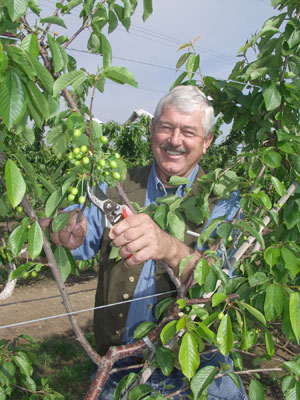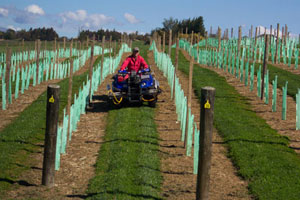Horticultural Contractor
Tasks & duties

Horticultural contractors may do some or all of the following:
-
work out the cost of doing a job and how much to charge, and negotiate this with clients
-
write proposals to orchard or vineyard owners/managers about the work they can offer and its cost
-
promote their services to new clients
-
hire, train and manage workers
-
tell crews where they will be working and what they will be doing
-
ensure crews work safely and correctly use equipment
-
ensure work is of a high standard and that it meets certification requirements (if necessary)
-
prepare accounts, budgets and other paperwork for the business
-
write safety reports
-
manage properties on behalf of clients
-
provide specialist services such as grafting, or pollen collection and distribution
-
organise other jobs for their workers in the off season
Specialisations
Horticultural contractors tend to specialise in either:
-
providing labour to harvest fruit or prune or train plants
-
providing services such as spraying or mowing
Contractors and their gangs may specialise in:
-
planting
-
pruning
-
thinning flowers and fruit
-
tying down vines
-
spraying
-
picking
They may also offer a year-round service covering all these things and possibly including other work off season as well.
Skills & knowledge

Horticultural contractors need specific skills in their area, particularly:
-
planting, thinning and pruning, and/or harvesting skills
-
knowledge of orchard processes such as pruning, picking and spraying
-
knowledge of crops, soils, horticultural chemicals, pests and diseases
-
practical skills in using horticultural equipment and machinery such as secateurs or tractors
-
knowledge of how to mix and apply sprays and fertilisers
-
basic first aid skills
-
knowledge of how to interpret and gauge basic weather information
Horticultural contractors also need business skills such as:
-
knowledge of Occupational Safety and Health (OSH) regulations and hazard identification
-
knowledge of employment regulations
-
marketing, management, budgeting, accounting and administration skills
-
knowledge of contracts and basic accounting practices
-
good people management and communication skills, including the ability to train and manage staff
-
good planning and organisational ability
Entry requirements
To become a horticultural contractor you need to have relevant experience and training in horticulture.
Secondary education
Useful subjects include English, maths, horticulture, biology and workshop technology.
Training on the job
Horticultural contractors can pick up additional skills by attending seminars or courses.
Registration
Horticultural contractors can take part in the Recognised Seasonal Employer (RSE) scheme, which was set up with the Department of Labour.
This scheme allows employers to offer work to seasonal workers from Pacific Islands. Employers must be accredited and provide a set standard of accommodation and care for the workers.
Other Requirements
It is useful to be accredited as an Approved Supplier under a GAP (Good Agricultural Practice) programme. There are a number of programmes including New Zealand GAP and Global GAP. AssureQuality has information about all the programmes.
Certificates needed to use pesticides and other agrichemicals
- A GROWSAFE ® certificate, or similar qualification, is needed for spraying.
- An Approved Handler certificate is necessary for handling some pesticides, and supervising other workers who are spraying.
- Those who are spraying for work on other people's property need to have a Registered Chemical Applicator certificate.
Useful experience
Work in the horticulture field is essential.
For more information, please refer to Career Services.
Document Actions
